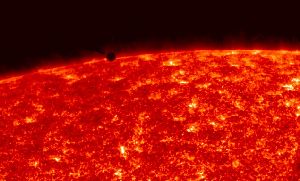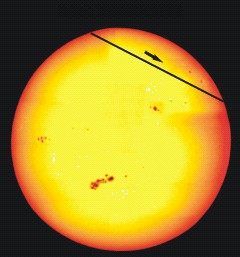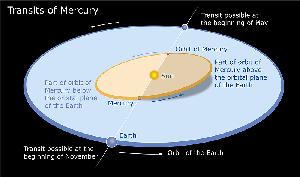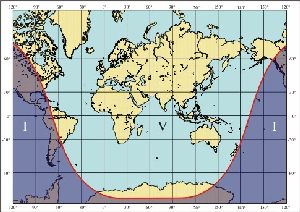Mercury Transit on May 7, 2003  Short Notes for Students and Teachers Short Notes for Students and Teachers The Mercury Transit on May 7, 2003 |  | | Mercury (black round spot at the limb) in front of the Sun as observed by the Trace satellite in 1999. |
On May 7, 2003, the planet Mercury will pass in front of the Sun as a small dark point. This event will be a kind of eclipse of the Sun - however, it is not caused by the Moon but by a planet. |  | | Path of Mercury on the Sun'sd disk on May 7, 2003. |
The transit of Mercury across the disk of the Sun will be very difficult to see - the disk of Mercury is very small and a powerful telescope is needed to make an observation. Note also that such an observation of the Sun is very dangerous for your eyes without special protection. The only really safe way is to project an image of the Sun on a white screen (or paper). |  | | The faint disk of Mercury on the disk of the Sun. |
Since this observation is difficult to make, we recommend to watch the event through a web site that is connected to a powerful professional telescope in real time (webcam). This is planned at the following websites: http://www.eso.org/public/outreach/eduoff/vt-2004/mt-2003/mt-display.html
http://bass2000.obs pm.fr/sites/mt2003/mt2003.php
http://soho.nascom.nasa.gov/soc/mercury2003/ |  | | Orbits of Mercury and the Earth around the Sun. |
The planet Mercury orbits the Sun inside the orbit of the Earth and every 3 months, Mercury passes between the Earth and the Sun. However, we do not see a transit on the disk of the Sun each time, because of the angle between the orbital planes of Mercury and Earth. The transit occurs only when the Sun, Mercury and the Earth are near the same line. This will occur next time on May 7, 2003. |  | | The transit of Mercury will be visible in the V zone. |
This observation will be possible from Europe and Asia. We encourage you to contact an astronomical observatory, science center or amateur club in your neighbourhood. You may ask them about the possibility to participate in a public observation of this event. Why is this event important? Because it is a kind of "preview" of a more important astronomical event. Next year on June 8, 2004, the planet Venus will pass in front of the Sun . Venus is larger and nearer than Mercury and that event will be easily observable. The observation of a transit of Venus is much more rare than a transit of Mercury, it happens only two times every 120 years and no one alive today has ever seen a transit of Venus. In the past, astronomical observations of Venus transits allowed to measure the Universe. We invite you to participate next year in our large, public programme to observe and time the transit of Venus. We are setting up a network of observers open to high schools, amateur clubs,... and we hope that you will join us in this project. More information is available at: http://www.eso.org/public/outreach/eduoff/vt-2004/
http://www.imcce.fr/vt2004/
http://www.obspm.fr |
|
|
| | |